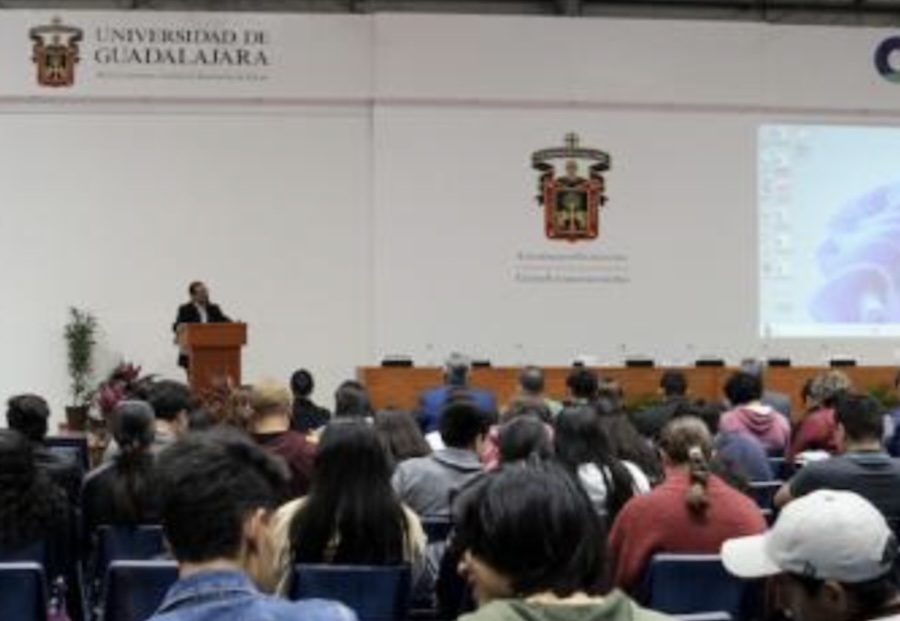… EDUCATION FOR PEACE …
An article from the Universidad de Guadelajara
The VI Global Culture of Peace Forum took place in the Oral Trial Room of the Centro Universitario del Sur (CUSur), under the motto “Actions for Peace.” The event aims to analyze the advances of the culture of peace with a citizen focus, through education, development and transformation at the national and international level, in order to achieve the objectives of peace, justice and security. It is organized by the University Rights Ombudsman of the University of Guadalajara (UdeG).

Dr. José Guadalupe Salazar Estrada, Rector of CUSur, addressed a few words to those present, pointing out that the university center follows guidelines established by the University of Guadalajara (UdeG) through the Council of Rectors and the General University Council. This is done to guarantee the use and respect of University Rights and Human Rights.
“The University of Guadalajara, as an institution of academic excellence and with social responsibility, has undertaken a series of measures that support the training of highly qualified human resources to support and operate the implementation of the culture of peace […] As part of the Institutional Development Plan, the doctoral program in Human Rights was created,” mentioned Dr. Salazar Estrada.
Likewise, he highlighted that the university center monitors violations of university regulations, the protocol for the prevention, care, punishment and eradication of gender violence, and issues of human rights, regulated as well by the Ombudsman’s Office. These elements are consolidated as a responsibility to contribute to the Culture of Peace, promoting respect for all people and the defense of human rights.
Professor Hiram Valdez Chávez, founding President of the First National Congress of Culture of Peace (COMNAPAZ) Mexico, explained that this forum is of great importance in the country, being an international platform for participation by citizens, international organizations and civil associations of Human Rights, Culture of Peace and Human Development.
(Article continued in right column)
Is there progress towards a culture of peace in Mexico?
(Article continued from left column)
“This forum is undoubtedly a great challenge, especially to design and carry out year after year in strengthening international peace and educational models that involve the professionalization of actors involved in the culture of peace,” explained Valdez Chávez.
Dr. Norman Bardavid Nissin, President of the Global Citizen Organization for the Culture of Peace, explained that peace is a state of being in unity, observed from three dimensions: individual, social and environmental. At the same time, he highlighted that the citizen forum was born with the intention of generating a global organization that could linki to national peace commissions that have followed the example of Mexico.
Dr. Dante Jaime Haro Reyes, Defender of University Rights at the UdeG, commented that the responsibility of each human being is to turn into reality the values, attitudes, and behaviors that promote the culture of peace. This is achieved by acting within the family, local citizen, regional and national framework.
Finally, Dr. Andrés Valdez Zepeda, Academic Secretary of CUSur, recited a poem he authored titled “Peace is the way.”
As part of the activities of the VI Global Forum on the Culture of Peace, the master conference “Peace Studies in Latin America” was held in the Adolfo Aguilar Zínser Auditorium, given by Dr. Fernando Montiel, Director of the Galtung Institute, headquarters in Mexico and Representative of Johan Galtung in Latin America. He highlighted that peace research and the pacifist movement are two different things but they are connected.
He referred to the first generation of peace activism, understood as opposition to war and open violence, that is, the search for peace from a moral perspective by condemning violence in ethical and moral terms.
In this context, Dr. Fernando Montiel questioned whether Mexico is in a state of peace or war. He highlighted that, according to the basic definitions of Public International Law, war is equal to any armed conflict that causes more than a thousand deaths per year. A few years ago, the State Department maintained that nearly 300,000 people have lost their lives in Mexico for reasons related to organized crime.
“Mexico is a country at war by any metric. Why isn’t this recognized? Because Mexico has an internal conflict, not a war. The numbers say that a fierce humanitarian tragedy is occurring, no matter if it is a war against drug trafficking in particular or an internal armed conflict […] The truth is that the suffering is there regardless of the labels, said Fernando Montiel.
Finally, he commented that the development of peace studies is part of the pacifist movement, since they are academic research disciplines existing in university faculties whose objective is to find the way in which peace can be achieved. For this reason, he explained that in 1959 the first Peace Research Center in the world was founded in Norway, the famous Peace Research Institute of Oslo (PRIO). Five years later, in 1964, the first journal specialized in peace research, the Journal of Peace Research, was established, becoming the formal beginning of peace studies as a publicly recognized academic discipline.
Subsequently, the panel “Construction of Citizenship and Promotion of the Culture of Peace” was held, as well as the international tables “Education, Consciousness and Peace”, Public Policies of Peace, Security, Justice and Peace. In addition, comprehensive peace-building workshops were taught in different classrooms at the university center.